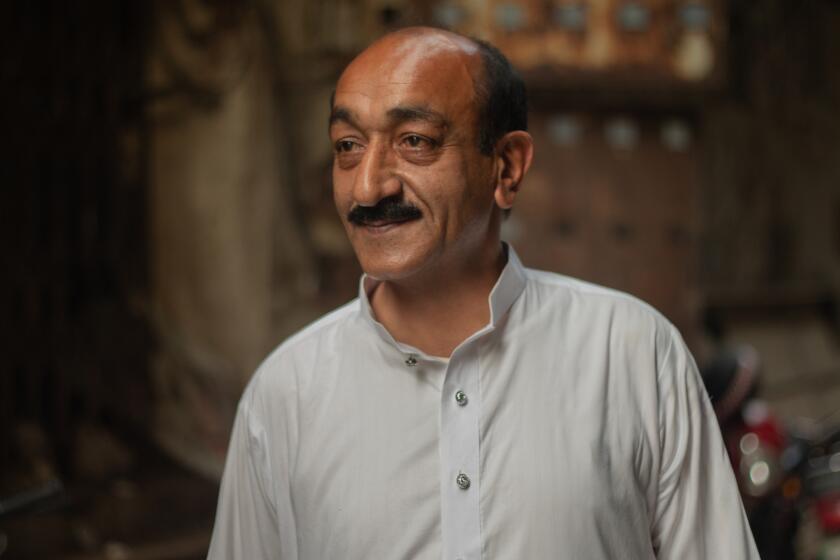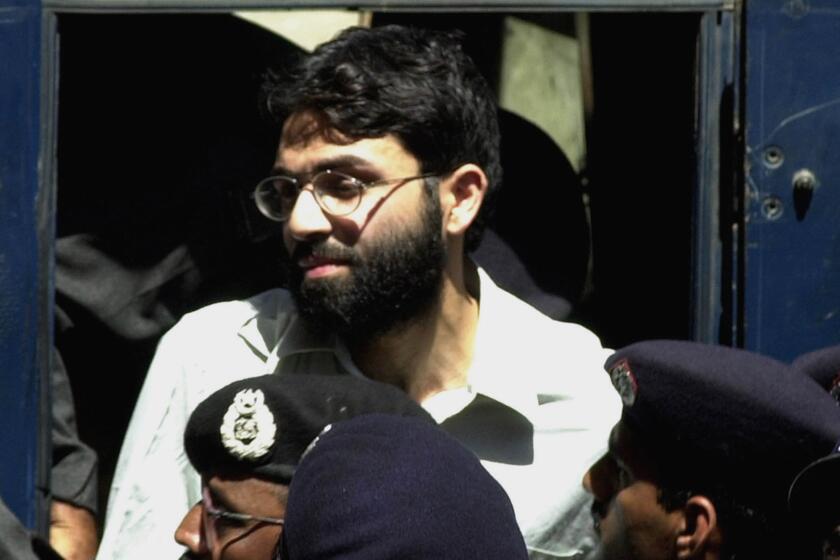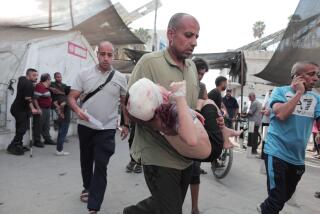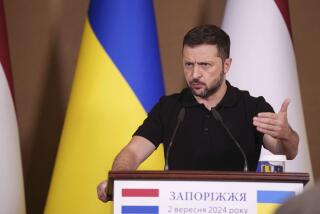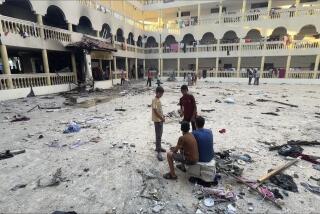Bombing at Pakistani madrassa kills 8 students, wounds 136
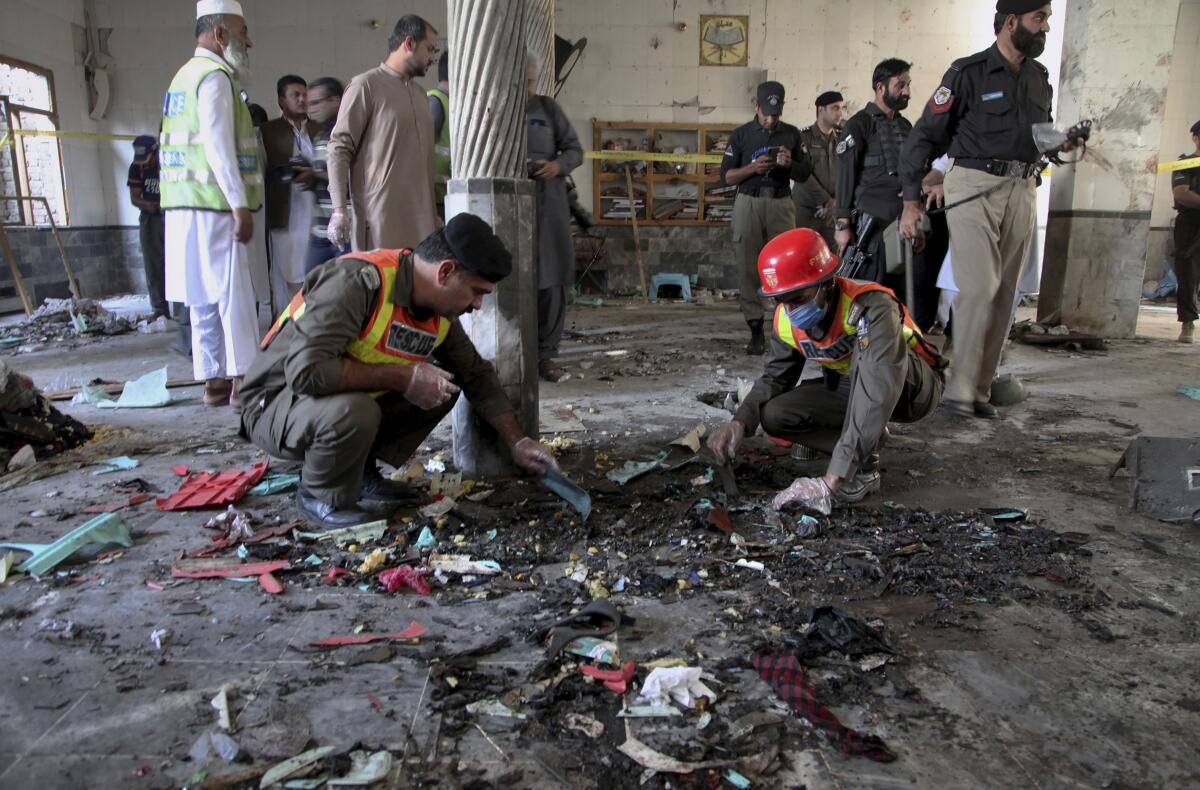
- Share via
PESHAWAR, Pakistan — A powerful bomb blast ripped through an Islamic school on the outskirts of the northwest Pakistani city of Peshawar on Tuesday morning, killing at least eight students and wounding 136 others, police and a hospital spokesman said.
The bombing happened as a prominent religious scholar during a special class was delivering a lecture about the teachings of Islam at the main hall of the Jamia Zubairia madrassa, said police officer Waqar Azim. He said initial investigations suggested the bomb went off minutes after someone left a bag at the madrassa.
TV footage showed the madrassa’s damaged main hall, where the bomb exploded. The hall was littered with broken glass and its carpet stained with blood. Police said at least 11 pounds of explosives were used in the attack.
No one immediately claimed responsibility for the attack in Peshawar, the provincial capital of Pakistan’s Khyber Pakhtunkhwa province, bordering Afghanistan. The province has been the scene of militant attacks in recent years, but sectarian violence has also killed or wounded people at mosques or madrassas across Pakistan.
Several of the wounded students were in critical condition, and hospital authorities feared the death toll could climb further. Authorities said some teachers and employees were also wounded in the bombing.
Almost all of the students were in their mid-20s.
China’s oppression of Muslims reaches beyond Xinjiang into Pakistan. Why does it stay quiet?
Shortly after the attack, residents rushed to the madrassa to check on sons or relatives studying there. Many relatives gathered at the city’s main Lady Reading Hospital, where the dead and wounded students were brought by police in ambulances and other vehicles.
Some Afghan students studying at the madrassa were also among the wounded, officials said.
Pakistani Prime Minister Imran Khan condemned the bombing and asked authorities to ensure the provision of the best possible medical aid to the victims.
“I want to assure my nation we will ensure the terrorists responsible for this cowardly barbaric attack are brought to justice,” Khan said.
The bombing drew condemnation from the country’s opposition party, which has been holding rallies meant to force Khan’s government to quit.
The United Nations’ children’s agency, UNICEF, also condemned the attack. In a statement, its representative in Pakistan, Aida Girma, said “education is the fundamental right of every girl and boy, everywhere. Schools must never be targeted.”
From his hospital bed, a wounded student, Mohammad Saqib, 24, said religious scholar Rahimullah Haqqani was explaining verses from the Quran when suddenly they heard a deafening sound, followed by cries and the sight of bloodied students asking for help.
“Someone helped me and put me in an ambulance and I was brought to hospital,” said Saqib, who had bandages on both arms but was listed in stable condition.
Pakistan’s high court accepts an appeal by slain U.S. reporter Daniel Pearl’s family to keep one of his alleged killers on death row over the slaying.
Another witness, Saeed Ullah, 24, said up to 500 students were present at the madrassa’s main hall at the time of the explosion.
A video filmed by a student at the scene showed the Islamic scholar Haqqani delivering a lecture when the bomb exploded. It was unclear whether the teacher was among the wounded.
Mohammad Asim, a spokesman at the Lady Reading Hospital, said eight students died at the hospital and they received dozens of wounded people, mostly students.
The attack comes days after Pakistani intelligence alerted that militants could target public places and important buildings, including madrassas and mosques across Pakistan.
Two days ago, a bombing in the southwestern city of Quetta killed three people. The Pakistani Taliban have been targeting public places, schools, mosques and the military across the country since 2001, when Pakistan joined the U.S.-led “war on terror” following the Sept. 11, 2001, attacks on New York and Washington.
Since then, insurgents have declared war on the government of Pakistan and carried out numerous attacks, including a brutal assault on an army-run school in the city of Peshawar in 2014 that killed 140 children and several teachers.
Mohammad Khurasani, a spokesman for the Pakistani Taliban, condemned Tuesday’s bombing. In a statement, he described the attack as a cowardly act, claiming that the country’s institutions were behind it.
More to Read
Sign up for Essential California
The most important California stories and recommendations in your inbox every morning.
You may occasionally receive promotional content from the Los Angeles Times.
